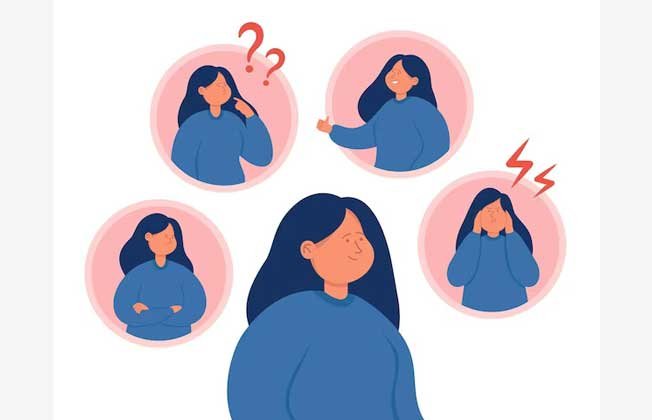
Personality is the way one views life, relates to the outside world and understands oneself. It is the unique combination of thoughts, emotions and behaviours that makes one’s personality.
Personality disorder is a condition in which the person thinks, feels and behaves in a way that deviates from the norm, causes distress and trouble perceiving and relating to people and situations.
Personality disorder affects the following areas:
- How a person thinks about self and others
- How a person relates to other people and situations
- Emotional responses
- Controlling behaviour
What are the factors that increase your risk of personality disorders?
- Family history of personality disorders
- Abusive childhood
What are the types of personality disorders?
Personality disorders tend to begin during teenage and can last for a long time. There are many types of personality disorders:
- Antisocial personality disorder is a disorder in which the person has complete disregard for the needs and feelings of others. It involves consistently irresponsible and impulsive behaviour, and repeated violation of other’s rights.
- Avoidant personality disorder is a condition in which the patient feels extremely shy, super sensitive to criticism and has feelings of inadequacy.
- Borderline personality disorder is characterised by impulsive and reckless behaviour, intense emotions and unstable relationships. A person with this condition is likely to have strong feeling of emptiness with meaningless spurts of anger and even repeated attempts of suicide.
- Dependent personality disorder features submissiveness and a need to be taken care of. People with this disorder fail to make even the simplest of decisions without assurance from others.
- Histrionic personality disorder is characterised by excessive attention seeking behaviour and quickly shifty moods and emotions.
- Narcissistic personality disorder involves obsessive need for admiration with an absurd sense of self importance and a complete lack of empathy.
- Obsessive compulsive personality disorder involves being overly focused on the details with obsession for orderliness, perfection and control.
- Paranoid personality disorder is characterised by suspicion and complete lack of trust in others.
- Schizoid personality disorder involves social detachment and lack of emotional expression.
- Schizotypal personality disorder is a condition wherein the patient displays eccentric behaviour and distorted thinking. He or she may have social anxiety and be very uncomfortable in close relationships.
How is a personality disorder diagnosed?
The psychiatrist may conduct the following evaluations to diagnose a personality disorder:
- Make an in depth enquiry about your health by asking the patient a series of questions.
- Lab and screening tests to rule out other medical reasons, alcohol or drugs.
- Psychiatric evaluation through discussion about the patient’s thoughts, emotions and behaviour.
What are the treatment options?
The type of treatment depends on the kind of personality disorder the patient has, the severity of the disorder and his or her present life situation. As personality disorders are long standing, they require treatment for several months or even years.
Some of the treatment options include the following:
- Psychotherapy
Psychotherapy can help the patient understand his or her behaviour and identify the thought patterns or feelings that act as triggers. A good psychotherapist can help the patient learn to effectively cope with symptoms. Some of the most effective types of psychotherapy include:
- Cognitive behavioural therapy
- Psychodynamic therapy
- Dialectical behaviour therapy
- Pharmacotherapy
There are many types of medications that can help relieve symptoms of personality disorders. Some of these include:
- Antidepressants to help with anger, sadness or impulsive behaviour.
- Mood stabilisers to reduce irritability and aggression and even out mood swings.
- Antipsychotic medications in case the patient experiences psychosis.
- Anti-anxiety medications to help the patient with sleeplessness or severe anxiety.
Holistic Mind Clinic, we believe that mental health issues such as personality disorders emerge due to a combination of many factors such as genes, a person’s support network, environmental and social changes and nurtured psychological tendencies. As such, our treatment methods involve a mix of different approaches to ensure successful outcomes for the patient.
